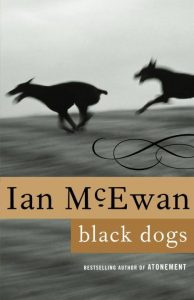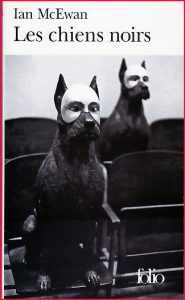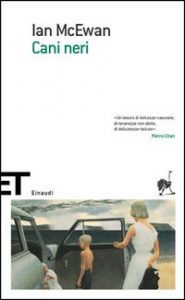Black Dogs – Ian McEwan – 1992

The following is a compilation of discussions and reviews from the previous version of our website. We hope you enjoy these older deliberations. Just beware, there are spoilers in here.
ReadLit Team
Posted by Anna van Gelderen on 26/3/2002, 17:16:32
Until recently I had only read one novel by Ian McEwan, Enduring Love, which I found so excellent that I could not imagine that the rest of his work could be that good. Before I read Enduring Love I had always had the idea that McEwan was a glorified thriller writer and I believe that he did start out that way. I also noticed from the reviews at Amazon.co.uk, that several readers of Black Dogs had expected a thriller and were disappointed to find a literary novel of ideas (although they failed to recognize it as such). My favourite is this one (two stars): “Although I thought the book was on the whole dull, I would just like to say what a great few passages there were concerning hitting children.” It is obvious from this and some other disappointed reactions that these are readers who are mainly concerned with tight plotting and “interesting” characters and that they therefore find Black Dogs wanting.
And it is true, the book proceeds by fits and starts, there is not one central story, only a pivotal incident.The characters of Bernard and June as well as the incident with the dogs are heavily charged with a slightly ambiguous symbolic content that transcends a mere “story”, and that makes it hard to pin both the characters and the incident down. So, yes, I can see why some people find this a somewhat frustrating read.
Personally, however, I found the book intriguing, tantalizing and beautifully complex. It offers much more than just the dichotomy between Bernard’s rationality and June’s mysticism. First of all, they are very much real individuals. We have already established from Amsterdam that Ian McEwan is very good at that. Second, they are seen by someone who instead of passionately believing in an ideal, does not have any convictions, but is fascinated by both stances. He provides relief and (without seeming to realize it) a third way to go through life.
Most impressive of all I found the final image of the dogs vanishing in the distance, bound to return and do evil in another place. This image has stayed with me ever since I finished the book. I will quote it in full (and not only to flesh out my contribution, but also because I think the writing is simply marvellous):
“But it is the black dogs I return to most ofter. They trouble me when I consider what happiness I owe them, especially when I allow myself to think of them, not as animals, but as spirit hounds, incarnations. June told me that throughout her life she sometimes used to see them, really see them, on the retina in the giddy seconds before sleep. They are running down the path into the Gorge of the Vis, the bigger one trailing blood on the white stones. They are crossing the shadow line and going deeper where the sun never reaches, and the amiable drunken mayor will not be sending his men in pursuit for they are crossing the river in the dead of night, and forcing a way up the other side to cross the Causse; and as sleep rolls in they are receding from her, black stains in the grey of dawn, fading as they move into the foothills of the mountains from where they will return to haunt us, somewhere in Europe, in another time.”
Isn’t it interesting that June is not haunted by the moment of the attack but instead by the dogs’ retreat?
Finally I have a number of questions I would like to discuss with you. I don’t have ready answers to them, only opinions. For instance:
* would June and Bernard’s marriage have turned out differently if Bernard had not stopped to admire the caterpillars?
* was the incident with the dogs truly pivotal for June, or did she make it that way in hindsight? does it matter?
* what do you make of the mayor’s version of what the black dogs were for? and of his subsequent lack of action?
* is there a correct way to deal with evil? what do you think Ian McEwan’s stand is?
PS: Did any of you knew that Winston Churchil seems to have called his depressions “my black dogs”?
Posted by Guillermo Maynez on 27/3/2002, 2:19:05
I think this was a very good book, although certainly it’s an unusual story (which is good).
Anna’s questions are good also, and just like her, I only have opinions:
1. I don’t think Bernard and June’s marriage would have been different at all. You can see while reading the book that the estrangement was an event waiting to happen, and that is even prefigurated in that scene when Bernard -in an analogous moment of scientific extasis- kills a red dragonfly. She feels that it is an awful attack on life and that her child is going to suffer Nature’s revenge. You can see where they’re going: Bernard on and on with reason and science, June on and on with intuition, mysticism and emotion.
2. The incident with the dogs, though frightening enough to scare the wits out of just about anybody (except hunters or really brave people), I don’t see it as enpugh to destroy a marriage or drive two people apart for ever. In any case, it’s just a rapid cathalist that brings about June’s retirement from the world. Right before she realizes the dogs are there, she’s starting to experience an epiphany, and right when they start walking down the gorge, she is already feeling bad vibrations (was it her mother telling her about impending danger, just like with Jeremy and the scorpion?).
3. The rape of a woman by the black dogs may or may not be right. It’s obvious that the mayor is not a dilligent and well-meaning person, so nobody can really expect him to track down the dogs.
4. If you find a correct way to deal with evil, you’ll be superior to Christ and all the prophets, since it’s one of the unresolved basic questions of humankind. So far we have come up with: love, forgiveness, respect, loyalty, solidarity. But to not much account, as reported by the local newspapers.
~
Posted by Lale on 28/3/2002, 10:36:41
I’d like to start with a review I read in amazon.co.uk:
Don’t believe the hype., 30 July, 1999
Reviewer: Marcus from LondonIan McEwan is the best thing since sliced bread or so the present day hype expects us to believe.
Synopsis of the book. Newly married woman comes across some big dogs whilst on her honeymoon (en france) – buys a cottage (en france) and in doing so annoys her husband – they split up and she dies whilst he grows old and goes a bit bonkers. Simple. Yes, it is.
Add some nice scenic descriptions, some nice vocabulary and an orphan. Bob’s your uncle, you’ve got a best seller on your hands.
A bit like low fat food. Promises a lot, yet fails to satisfy.
Now, this is not exactly what I thought about the book, but almost!
The book started well. The early years of Jeremy… I liked it. But once it got to Bernard and June, the story got bumpy. A few disconnected sub-stories broke the flow. The story of Jeremy and his wife (I forgot her name) meeting for the first time on a business trip, and then their visiting of a Nazi camp… That’s a nice short story but it broke the fluidity of the book.
The restaurant scene in which a family is publicly and inappropriately disciplining their child; again, very nice short story, totally out of place in this book.
This was not really like a novel. It was more like a bunch of ideas McEwan had, and a little unnaturally, he tried to sew them together into a book. Instead, he could have written a collection of short stories. The spider in the cottage, for instance, in itself would make a good short story. Why patch, forcefully, perfectly good tales into a novel. A novel, by definition, has to have a story line that goes from beginning to the end. We have read other books without central plots, and even without climactic endings but none of them had this many disengaged bits and pieces as this one.
The only part of the book which I really really liked reading was the Berlin part. I lived in Germany between end of 1985 and beginning of 1989, for three years and three months exactly. During that time, I visited Berlin numerous times. The wall was still up back then of course. I visited the small museum at Checkpoint Charlie. I walked along the wall. The wall, on the western side was decorated with all sorts of murals, graffiti, street art. There were these self-standing wooden ladders with small platforms on top. Placed irregularly along the wall. You could get up them and look at the other side. I remembered all these and it was very interesting for me to read that part of the book.
Again in the Berlin portion of the book, there were other reminders of my time in Germany, the racism, the nationalism, the rude remarks and attacks. I too was subjected to discrimination, and at the most unexpected (and totally unacceptable to) places such as the doctor’s office and the hospital. I have pictures taken under a wall graffiti that said “Turken Rausen”. So, I smiled a little when in the book I saw the mention of the wall signs that say “Ausländer Raus”. Well, I am “raus” now and I think it’s Germany’s loss.
Anyway, back to the book, the encounter with the dogs was brilliantly written. That’s where we see the real Ian McEwan. I imagined myself in June’s place and my husband in Bernard’s place. I wouldn’t be able to get over my bitterness for my husband’s missing the big scene. He has to be there, not to save me from being shred to pieces, but to see 1. the severeness of the situation, and 2. to witness my bravery and my brush with death.
* would June and Bernard’s marriage have turned out differently if Bernard had not stopped to admire the caterpillars?
I agree with Guillermo. They were already, unconsciously maybe, going in different directions.
* was the incident with the dogs truly pivotal for June, or did she make it that way in hindsight? does it matter?
I heard from a bank cashier girl who was once held at gun point by bank robbers that having a near death experience can drastically alter your view of life, world, values, and in some case your reason, your logic, your sanity. I think June played and re-played that scene in her head. She realized that it was much bigger than what she experienced right there and then. While it was happening and shortly after, she probably couldn’t see the severity of the situation. But later on when she could really sit down and think about it, it must have made radical changes in her. Let’s face it, being shred to pieces by a dog is scary. Some of you may have heard, this recently happened in United States: One lady, coming to her apartment with her groceries, was massacred by a dog in the hallway. I believe the court case against the owners of the dog (actually there were two dogs, but only one was “coupable”) just concluded and the owners were – I think rightfully- found responsible.
* what do you make of the mayor’s version of what the black dogs were for? and of his subsequent lack of action?
The mayor was a despicable person. I cannot believe the story he was telling. He enjoys talking about it, just to scandalize the folks.
* is there a correct way to deal with evil? what do you think Ian McEwan’s stand is?
I like Guillermo’s answer. Evil will always continue to do temporary damage.
I don’t know McEwan’s stand but the protagonist Jeremy was confused. He was tempted to believe in the “you killed the butterfly, so our unborn baby will be harmed”. He tried to argue his wife’s 6th finger. The incident with the spider and his subsequent thought made him look very superstitious.
>PS: Did any of you knew that Winston Churchill seems to have called his depressions “my black dogs”?
This is very interesting. I recall having heard that before. I am sure there is a connection. Ian McEwan must have wanted that subtle relationship between Churchill’s words and June’s (Bernard’s, maybe even Jeremy’s) depression. Even if there is no deeper meaning, it is a nice connection, McEwan must have thought that.
~
Posted by Lale on 28/3/2002, 16:16:33
Addendum to the function of the dogs: When I said I didn’t believe the mayor about the dogs, that was only because he is a disgusting man and I wouldn’t believe anything he says. But I also don’t put it beyond a group of mad soldiers to do what was implied. They have done worse things. Humans proved time and again that there is no lack of ingenuity to their cruelty.

Posted by len on 28/3/2002, 16:54:50
Lale writes:
>I think June played and re-played that scene in her head. She realized that it was much bigger than what she experienced right there and then. While it was happening and shortly after, she probably couldn’t see the severity of the situation. But later on when she could really sit down and think about it, it must have made radical changes in her.
This was for the me the essence of this book: the attribution of significance to events. I will have more to say about this when I get around to writing down my thoughts in a more organized fashion.
“She realized that it was much bigger than what she experienced right there and then.”
I have to wonder if she didn’t *make* it much bigger than what she experienced right there and then. True, the possibility of attack by the dogs was unquestionably a threatening event, but it’s becoming the pivotal point of her life and her relationship with her husband could have been as much her doing as anything inherent in the event itself.


Posted by Anna van Gelderen on 31/3/2002, 15:52:55
Lale, your claim that “a novel, by definition, has to have a story line that goes from beginning to the end” has made me look again at this novel. Of course there should be a unifying factor in any novel. If there weren’t you would be right in calling it a bunch of short stories. But in this book the question and suspense of what happened with the black dogs (the incident is referred to as pivotal already on page 19) is the thread that links everything else. And there is also from the beginning the question of which attitude towards life is better, Bernard’s or June’s or something else again. I did not find it hard to see this question illustrated in different aspects of the book, especially not in hindsight :-). Take for instance the mayor. I agree that the mayor is despicable. He is in a position to do something about these dangerous dogs, but can’t be bothered because he is not in any immediate personal danger. Contrast that with the incident in Berlin, where Bernard stands up for his principles and faces up to these Neo-Nazi guys. Jeremy thinks it is far too dangerous to get involved, but just as he is trying to get him out of things, this girl who is obviously afraid of nobody swoops in and rescues Bernard. I would probably never be as brave as Bernard or the girl, but I admire them tremendously for their courage. I like the way that McEwan shows us varying degrees of courage and cowardice in this novel: from the German girl, Bernard and June, through Jeremy, down to the mayor. I suspect most of us are like Jeremy, much as we would like to think differently. By the way, the incident in the restaurant with the little boy also fits in very well with this theme, doesn’t it? Therefore I do not think this scene was out of place. It shows Jeremy trying to do something when he perceives an injustice – an act that echoes the incident in Berlin I referred to. So I think that everything does tie in together quite well.
~
Posted by Randy on 29/3/2002, 22:05:45
It was my first McEwan and I loved it. Initially I appreciated how, in having Jeremy’s parents die early, McEwan justified the narrator’s interest in adults and in attaching himself to his wife’s parents. Nice trick.
I think that Jeremy sort of plays stupid and says that he’s not really committed to one side (rationalist Bernard) or the other (spiritualist June) so that he can seem a less biased observer and guide us with a light hand without us feeling manipulated. This allows McEwan to come up with a more balanced middle road towards the end. I believe that his conclusion about evil has nothing to do with forgiving or forgetting, but about recognizing that evil is in all of us, everywhere, running about, and that we must be constantly vigilant in order to thwart it.
The mayor represents our good but blustery and ineffective intentions. Evil, The dogs, are out of sight and out of mind and we humans are less inclined to do anything about anything unless it’s staring us in the face. We deal with acute catastrophes not recurring chronic ever-growing problems (like global warming, species extinction, ocean pollution, etc…).
I think that the dogs were indeed pivotal in June’s transformation. The exact moment that was pivotal was when June decided to rush the dogs with her backpack and knife. She decided right then that she was sufficiently strong, independent, and responsible for her own life. She felt those new feelings, they saved her life, and she was indebted to them. She no longer “needed” Bertrand. She could be more spontaneous (buys the bergerie), and trust her intuition more to protect her and guide her to do the right thing. The dogs, evil or not, provoked her to showed her herself her inner strength and taught her to trust herself and that strength came from within.
For a short book, I thought the characters were adequately fleshed out, but I was mostly impressed by the thought and cleverness behind the writing.
I also commiserated with how all too easy it is to miscommunicate with someone you love and both stubbornly hold your ground. A bit of tragedy that felt unfortunately familiar.
I feel that no part was unnecessary to the book. The scorpion in the dark house was perhaps necessary to understand June’s effect on Jeremy. I also loved the end of the book and continue to return to it and reread it.
C’est ça. Thanks Lale for introducing me to McEwan even though this didn’t seem to be your favourite book…
~
Posted by Anna van Gelderen on 31/3/2002
Randy, I really liked your explanation for June’s change of heart. I had not thought of it myself, but it is logical, psychologically sound and it makes excellent sense in the light of the rest of her life.
I also think your final mark is exactly right: ( “… recognizing that evil is in all of us, everywhere, running about, and that we must be constantly vigilant in order to thwart it.”).
Posted by Chris on 30/3/2002, 20:45:18
I have to admit immediately that I was more impressed with some aspects of this book than others. I found McEwan’s characters to be excellently drawn and to be very believable personalities, but found his characterisation of the relationship between June and Bernard a bit contrived. The central issue of the book, June’s fear-driven “conversion” after the dog encounter, left me unconvinced.
Both June’s and Bernards characters seemed like they could have been real people. Their attraction to each other, despite their seemingly opposite personalities, makes a lot of sense because young people are often attracted to those whose traits seem to compliment, though not mirror, theirs (the yin to another’s yang). Ultimately, as happens quite frequently with such couplings, these same differences lead to a split. McEwan uses the dogs incident as the climactic episode in which the divergent personalities part company. I didn’t buy it. June’s fear, while very real, failed to impart to me any kind of supernatural import. Further, I was a bit disappointed in the story that the dogs were evil Nazi creations; the cliche of Nazi evil and epiphanal moments of enlightenment resulting from their actions (albeit indirect, in this case) is too convenient and tired for me.
I was never really bought into the idea that June and Bernard were still in love with each other so many years after the split. True, sometimes people do have love-hate relationships that they cannot let go, but J & B’s attraction to each other, given the brevity of their relationship and the length of time since their split, seemed a bit overreaching.
Reading “Black Dogs” was an interesting experience, because through the first 3/4 of the novel, I loved it. I enjoyed the author’s light, conversational style, and I liked the development and the contrasts between June and Bernard’s personalities. But the ending…ah, that’s when the roof fell in. Utterly disappointing. I thought that surely this story that made such excellent use of subtlety could not end in such a contrived, ham-handed fashion as it did, hinging on an unbelievable “conversion” from an encounter with a quasi-supernatural Nazi cliche.
Posted by Anna van Gelderen on 31/3/2002, 16:02:19
Chris, I don’t think you should confuse June’s vision of the dogs and the mayor’s tall story with the view the author presents. It is not the author who says the dogs are evil, that is June’s highly charged interpretation. And the mayor’s story – in my mind at least – is presented as convincingly unbelievable. So what we are left with are two huge feral dogs, frightening enough, but no mythical Nazi beasts: they are only that to June and to a drunken mayor who loves to scare people with sensational stories. Only in the end does McEwan use the dogs (as seen in a dreamlike state) as an image of the evil we have to confront in life. And even here the vision is – strictly speaking – June’s.
I would also like to quote Jeremy, in the prologue: “Whether June’s black dogs should be regarded as a potent symbol, a handy catch phrase, evidence of her credulity or a manifestation of a power that really exists, I cannot say.” In other words: the interpretation is up to the reader and therefore I do not agree that June’s episode is presented by the author as “an unbelievable “conversion” from an encounter with a quasi-supernatural Nazi cliché”. I do agree that she probably made the whole thing much larger in hindsight than it really was (although I also found Lale’s account of how a life-threatening experience can change your entire outlook on life convincing), but I think that this fits in very well with her character. Where Bernard seeks rational explanations for what happens to him, June creates symbols and myths to explain and give meaning to her actions.
:I was never really bought into the idea that June and
:Bernard were still in love with each other so many years after the
:split. True, sometimes people do have love-hate relationships that
:they cannot let go, but J & B’s attraction to each other,
:given the brevity of their relationship and
:the length of time since their split, seemed a bit overreaching.
Ah, but these things really happen. Believe me, I’ve seen it. There is this initial very strong and completely irrational attraction that will never go away. Just because it is strong and irrational, it is almost impossible to get rid of, even if you can hardly stand the other person now…
~
Posted by Chris on 1/4/2002, 19:01:36
I agree with you to a point, Anna. What disappointed me was that June, being something of a dynamic character, would have interpreted her encounter with the dogs as she did. Despite her spiritualism, she seemed to have a rational grip on probability and seemed unlikely to subscribe to something that outlandish (I’m not referring to the dogs as Nazis, but as harbingers of evil) as the dogs being messengers of doom. I grant the author a significant amount of leeway in constructing the “conversion” (note: the word is inappropriate, but I can’t think of another, hence the quotes), but I could not reconcile the event and it’s consequences as believable.
~
Posted by len on 4/4/2002, 23:13:40
Anna writes:
> And even here the vision is – strictly speaking – June’s.
Actually, it’s Jeremy’s rendition of what June told him, tempered by what Bernard told him. Remember, this book purports to have been written by Jeremy, not by McEwan.
Having read both Amsterdam and Black Dogs (which I reread a few days ago while flying), McEwan seems to me to make his characters overreact. Would June and Bernard really have separated over the black dog incident? Would Clive and Vernon really have killed one another over their perceived slights? It makes for more drama, but I find it hard to believe.
~
Posted by Dave on 5/4/2002, 3:36:14
Len, I thoroughly agree with you that in both books, McEwan seems to be using what I would call “intended exaggeration” as a sort of leitmotif. Or “character over-reaction” as you suggest. In my opinion, there is more of it in Amsterdam than in Black Dogs. And to answer your questions, I would say “No” to both of them. Yet I really enjoyed both books, (that’s the weird thing)… I loved the way the author presented everything. I want to go on and read more from him.
In the case of June and Bernard, would they really have separated over the black dogs incident? No. But I don’t believe they did. It had to have been much more than this, the black dogs bringing their lack of REAL communication to the foreground. For one thing, I think they married too soon. They had tasted and chewed on a lot of great ideas together (Communism for instance), but neither of them went on to digest anything together. They should have explored the areas of spirituality/rationality (ideas which do not necessarily have to be in opposition) before tying themselves to each other. The black dogs incident would not have been such a point of separation, in fact, it would have served as a point of strengthening (in an already healthy relationship). But, notice how June shrugs off Bernard’s questions and will not even tell him of her terror immediately after the incident? This reveals big problems prior to Bernard’s diversion-for-nature on the trail. June’s meeting with the dogs SNAPPED something in her perception of her NEED for Bernard. That much is believable. He wasn’t there for her, and beyond that, she experienced something that she could simply NOT translate to him. It does seem extreme, but here their paths diverged forever.
~
Posted by Len on 5/4/2002
At the sentence level, McEwan is an absolute genius. It’s the large scale flow of his stories that I can’t buy.
He’s sort of the Tchaikovsky of writers; gorgeous melodies, but no real mastery of large scale structure. Be that as it may, Tchaikovsky remains one of my favorite composers, and McEwan is still a joy to read, even if you have to respond “No way!” every now and then.
















